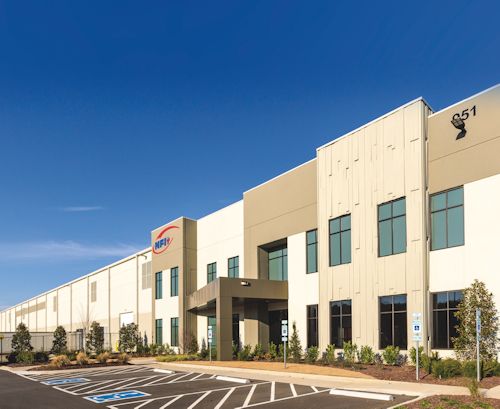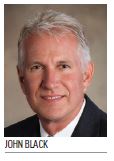Smyrna Airport Adds 600-Acre Business Park

The first axiom of real estate, “location, location, location,” is the secret behind the fast start of the new business park at Smyrna/Rutherford County Airport (MQY) in central Tennessee. The second axiom, “it’s all about relationships,” helps explain how the airport landed its first $100 million investor.
With 71,000 flight operations last year, MQY is the busiest general aviation airport in the state. It also serves as a reliever for Nashville International Airport, just 12 miles to the north.
To diversify MQY’s revenue stream, the Smyrna/Rutherford County Airport Authority has added a 600-acre business park on the west side of the airfield. The authority made the initial infrastructure improvements for the business park prior to the Great Recession, and continued with additional utility improvements in 2012 to prep the site for future development.
 Parcels will be leased to private developers, and the associated rental income will help underwrite airport operations and airside improvements. Jointly owned by Rutherford County and the town of Smyrna, MQY is self-supporting and does not receive any local funds, explains John Black, the airport’s executive director.
Parcels will be leased to private developers, and the associated rental income will help underwrite airport operations and airside improvements. Jointly owned by Rutherford County and the town of Smyrna, MQY is self-supporting and does not receive any local funds, explains John Black, the airport’s executive director.
|
facts&figures Project: Airport Business Park Location: Smyrna/Rutherford County (TN) Airport Owner: Smyrna/Rutherford County Airport Authority Consultant: Atkins Global Park Size: 600 acres Terms: 49-year land leases Total Projected Private Investment: $225 million Initial Developer: Hillwood Investment: $100 million Initial Development: 140 acres; 1.8 million sq. ft. of new construction in 4 buildings Annual Lease Payments: $600,000 (after 2-year grace period for construction & marketing) 1st Tenant: NFI, a logistics company that services Lowe’s Space Leased: 622,000-sq.-ft. warehouse |
According to projections, the completed business park will attract about $225 million in private sector investment and add 650 permanent jobs to the local economy.
The first four parcels—a total of 140 acres—have been leased to Texas-based Hillwood, a unit of the Perot family business empire. Hillwood is investing $100 million in four buildings that will ultimately offer tenants a total of 1.8 million square feet. The developer constructed the first two buildings on speculation, and one is already occupied. Crews broke ground on the third building in January and are expected to finish it in November. The fourth is scheduled to be complete next spring. According to Hillwood Market Leader Kurt Nelson, the company may lease additional acreage.
The airport authority has not hired an outside agent to market the MQY business park. Instead, Black works with the local real estate community to recruit interested developers. “As the infrastructure was going in, I made a point to establish good relationships with a lot of brokers in Tennessee,” he explains. “The brokers are usually the first to know what is coming into the area, and brokers did help connect the dots with Hillwood.”
Why Smyrna?
When Hillwood was shopping for potential sites to develop, it was not specifically looking for an airport property or even land near an airport. Proximity to Nashville was the key factor.
 “There is a lot of growth in Nashville,” explains Nelson. “We felt we could start a development there (in Smyrna) and be part of the growth. We were evaluating sites in the area, and the airport had a good location.”
“There is a lot of growth in Nashville,” explains Nelson. “We felt we could start a development there (in Smyrna) and be part of the growth. We were evaluating sites in the area, and the airport had a good location.”
Access to three interstates (I-24, I-40 and I-65) and a high-quality labor pool associated with the local Nissan plant proved to be strong selling points. So did the established base of companies on the south side of Nashville.
Representatives from MQY and Hillwood began talking in 2014, and by late last year, the developer had finished constructing two of its four buildings—a notably fast timeline for most business park ventures.

MQY is leasing its development sites on 49-year terms, with building ownership reverting to the airport at the end of the lease. Developers must build structures according to the airport’s design standards, and also complete roadways and utilities to the structures. After paying a deposit, developers have two years for construction and marketing before their lease
payments begin.
Hillwood will pay $600,000 per year after its build-outs are complete.
The master plan, crafted by the Nashville office of Atkins Global, divides MQY’s 600-acre business park into light industrial, commercial and aviation zones. Hillwood is leasing mostly industrial acres. About 35 acres of industrial space remains available—enough to support another 100,000-square-foot building, notes Black.
The airport is marketing 20 acres of commercial space for retail and hotel use. And 50 acres of the aviation zone could include direct access to the airfield. Hangars, aircraft maintenance shops and aircraft manufacturers are likely tenants for those spaces. There is also an option to extend a taxiway into some of the industrial parcels, notes Black.
If demand warrants, the airport has 45 acres on the east side of the airfield with direct airfield access that can be developed for aviation businesses. However, that acreage currently lacks utilities.
“The growth we have had entices more growth,” says Black, noting that the airport currently anticipates being completely built out in 10 to 15 years. “The timeframe is going to be much faster than we originally anticipated. The growth becomes exponential when things get going, as they have here, now that people can touch and feel it.”
As much as the airport stresses the advantages of locating a business on or near an active runway, direct airfield access has not been a factor in signing tenants.
NFI, a New Jersey-based logistics company that services Lowe’s Home Improvement, is leasing all of Hillwood’s first building. Just a small fraction of the 622,000-square-foot facility is devoted to office space, and the company’s inventory arrives and departures via trucks rather than airplanes.
When marketing its second building, Hillwood mentions that the 301,000-square-foot facility has airfield access, but does not make that the focus.
Cargo’s Role
Two former military runways—one 8,048 feet, the other 5,546 feet—allow MQY to handle Boeing 737s and DC-9 cargo jets. FedEx and UPS use the airport nightly, and other carriers fly in supplies to the Nissan plant and other local manufacturers.
Currently, the airport does not have a dedicated cargo warehouse on the airfield. Instead, freight is off-loaded and trucked directly to the nearby plants. “We will be reviewing cargo in the update of the master plan to see if we want to do more,” notes Black.
Years ago, when initially considering the prospect of a business park, MQY personnel traveled to Fort Worth, TX, to survey the 18,000-acre, all-cargo Alliance Field that Hillwood developed with the Perot family. (For more information about Alliance, click here.)

More Construction
The business park isn’t the only area of the airport currently being developed. Hollingshead Aviation, one of MQY’s two fixed-base operators, is building a 30,000-square-foot hangar, and the airport authority is also building a 30,000-square-foot hangar. Currently, there are 26 hangars at MQY, housing 224 based aircraft. Nine hangars are privately owned and will revert to the airport when their leases expire. Some were built by the U.S. Air Force around 1950.
Contour Aviation, the airport’s other fixed-base operator, bases a fleet of regional jets and turboprops at the field. The company uses the aircraft to fulfill essential air service contracts throughout the Southeast.
Beyond the airport’s potential improvements to further support cargo operations, it is also exploring the possibility of constructing a new terminal building and control tower. Ramp repairs, rehabbing Runway 1-19 (its shorter runway) and an airfield re-marking project are already slated for 2018.
FREE Whitepaper
PAVIX: Proven Winner for All Airport Concrete Infrastructure
International Chem-Crete Corporation (ICC) manufactures and sells PAVIX, a unique line of crystalline waterproofing products that penetrate into the surface of cured concrete to fill and seal pores and capillary voids, creating a long lasting protective zone within the concrete substrate.
Once concrete is treated, water is prevented from penetrating through this protective zone and causing associated damage, such as freeze-thaw cracking, reinforcing steel corrosion, chloride ion penetration, and ASR related cracking.
This white paper discusses how the PAVIX CCC100 technology works and its applications.








